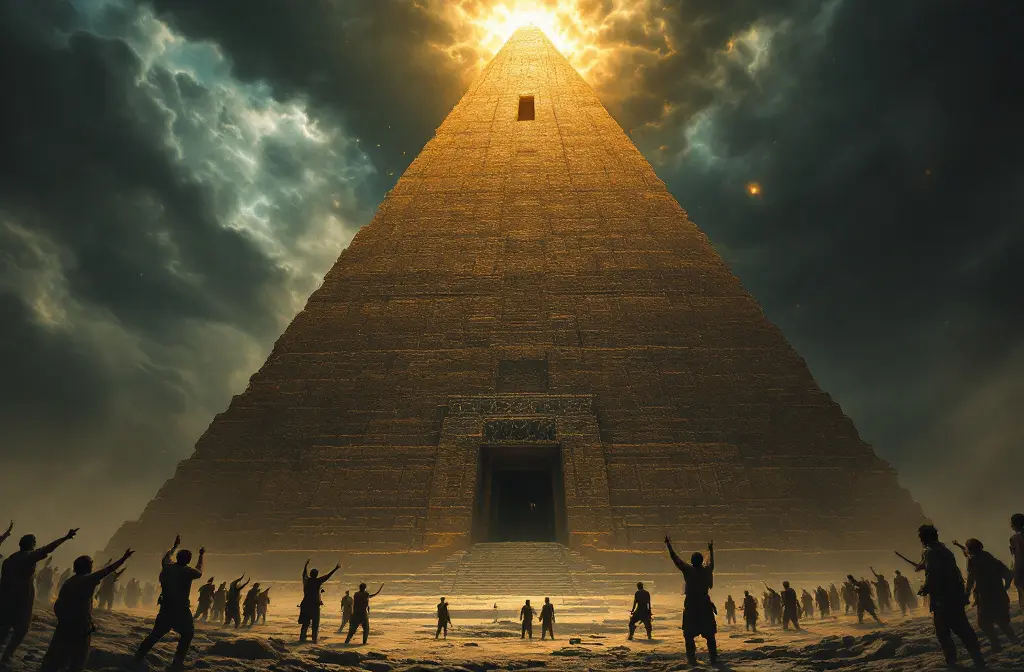You know the feeling. You’re driving in a thick fog, the kind where the road just disappears a few feet from your car. You’re gripping the wheel, knuckles white, leaning forward as if that’ll help you see. That knot in your stomach—a mix of fear and frustration—is the perfect picture of confusion. It’s paralyzing. And in a world screaming at us with endless opinions and a million different choices, it’s a place we end up far too often. Am I making the right call? Is this the right path? Why do I feel so completely lost?
When that fog rolls in, you start looking for a lighthouse. For Christians, that light is the Word of God. This brings us to a hard question: What the Bible says about confusion. Our truest compass point comes from 1 Corinthians 14:33, and it says something that can change everything: “For God is not the author of confusion, but of peace…”
That one sentence is a revolution. It’s a bold declaration that the messy, chaotic feeling of being lost is not from God. It’s not His signature. His very nature is peace. This isn’t just some nice little platitude to make us feel better; it’s a powerful tool for navigating life. It’s a solid rock to stand on when everything else feels like shifting sand. We’re going to dive deep into this verse, see where it came from, what it means for our lives, and how we can practically step out of the fog and into the light.
More in Ethics & Morality Category
What the Bible Says About Discernment
What the Bible Says About Condemning Others
Key Takeaways
- God’s Signature is Peace, Not Chaos: At its core, 1 Corinthians 14:33 tells us that God is a God of order and clarity. Confusion is the exact opposite of His character.
- Confusion Has a Source (and It Isn’t God): This verse gives us permission to find the real source of our confusion. It could be our own conflicting desires, the world’s misleading values, or spiritual opposition, but it’s not a state God wants for His children.
- An Orderly Life Reflects God: The original context was church worship, but the principle is universal. Bringing order to our thoughts, routines, and relationships aligns us with God’s peaceful nature.
- Peace is Your Compass: When you’re facing a choice, a deep, settled peace is often a green light. A persistent feeling of turmoil and confusion is a major red flag.
- Finding Clarity Takes Work: Getting out of the fog isn’t passive. It takes honest prayer, digging into Scripture, and getting wisdom from people you trust.
Have You Ever Felt Lost in a Fog of Uncertainty?
I know that fog intimately. I lived in it for what felt like an eternity right after college. The handshake. The goofy cap-and-gown picture. I’d checked all the boxes. But inside, I was a wreck. I’d picked my major based on practicality, not passion, and I was staring down a career path that felt like a forty-year countdown in a beige cubicle.
Every morning started with a lead weight in my stomach. The question—”So, what are you going to do with your life?”—wasn’t just coming from my relatives. It was screaming from my own soul. It was a roar. The confusion was deafening. I’d scroll through job postings, and each one felt like a little piece of my soul was chipping away. The world told me to climb a ladder, but I couldn’t even figure out which building to be in.
My friends were all moving on. Getting jobs, getting married. They had a map. Mine was blank.
The paralysis was crushing. I was so terrified of making the wrong move that I just… didn’t move. My prayers felt like they were bouncing off the ceiling. “God, what do you want me to do?” Silence. It felt like divine static, and I started to think maybe God was the one keeping me in the dark. It was in that pit of despair that 1 Corinthians 14:33 became a lifeline. The idea that God wasn’t the one authoring my confusion? That was revolutionary. If He wasn’t the source, that meant I could start looking for what was.
So, What Does 1 Corinthians 14:33 Actually Mean?
To really get what Paul is saying, we have to step back in time. He wasn’t writing a self-help blog or an inspirational quote for a coffee mug. He was writing to a real church with real, messy problems.
Who Was Paul Writing To?
The church in Corinth was, to put it nicely, a train wreck. They were vibrant and spiritually gifted, sure, but they were also incredibly chaotic. God had blessed them with amazing spiritual gifts, like prophecy and speaking in tongues, but they were using them in a way that caused a scene instead of building up the church.
Picture their worship service. Over here, someone is shouting out a prophecy. In another corner, a few people are speaking in tongues all at once, but no one is interpreting. Someone else is trying to teach over the noise. It was pure spiritual anarchy. A place that should have been defined by peace had become a stage for chaotic, competitive spirituality.
Paul steps in like a firm but loving father trying to restore some sanity. His instruction is blunt: everything should be done “decently and in order” (1 Corinthians 14:40). It’s right in the middle of this plea for order that he delivers the core truth: “For God is not the author of confusion, but of peace.” He’s telling them, “This chaos you’ve created? This does not look like the God you worship.”
Why Is God ‘Not the Author of Confusion’?
This phrase is one of the clearest descriptions of God’s character you’ll find. An “author” is an originator, a source. Paul is stating, in no uncertain terms, that confusion and chaos are not on God’s list of creations. They do not come from His hand.
Think about the first page of the Bible. What’s the first thing God does? He confronts a universe that is formless, empty, and dark—the definition of chaos. He speaks. He creates order. He separates light from dark, water from land. He creates rhythms. His very first act is to make beauty and order out of a chaotic mess. That’s who He is.
So, when we feel that disorienting, formless feeling in our own lives, we can be absolutely certain of one thing: this is not God’s handiwork. He’s the God who calms the storm, not the one who starts it. This truth is an anchor. It gives us permission to say, “Okay, this feeling of being lost is real, but it’s not from my Father. Something else is going on here.”
If God Isn’t the Source, Where Does All This Confusion Come From?
That’s the million-dollar question, isn’t it? If God isn’t sending the fog, what is? Understanding He’s not the source frees us up to look for the real culprit without blaming the one Person who can actually help. The Bible suggests a few possibilities.
Are My Own Desires Tripping Me Up?
James, the brother of Jesus, doesn’t pull any punches. He asks, “What causes fights and quarrels among you? Don’t they come from your desires that battle within you?” (James 4:1). He’s talking about fighting with others, but the principle is a perfect fit for our own internal chaos.
A lot of the time, our confusion is just the noise from a civil war inside our own hearts. Part of us genuinely wants to follow God. But another part wants what it wants—that specific relationship, that career, that comfort. When what we want clashes with what God says is best, the result is a massive cloud of confusion. We try to rationalize our desires. We look for loopholes.
We seek out advice from people who will tell us what we want to hear. This internal tug-of-war creates incredible turmoil. We feel pulled in two directions at once. That feeling is confusion. Clarity often begins at the moment of surrender, when we can finally say, “God, not what I want. What do You want?”
Is There a Spiritual Element to Confusion?
The Bible is plain about this: we are in a spiritual fight. Jesus called our enemy, Satan, “a liar and the father of lies” (John 8:44). And what is a liar’s primary weapon? Confusion. The enemy loves to sow seeds of doubt about God’s goodness and His Word.
He loves to whisper those nagging questions:
- Did God really say that?
- Are you sure God cares about this little problem of yours?
- If God is a God of peace, then why is your life such a mess?
This doesn’t mean we should blame every moment of indecision on the devil. That’s a cop-out. But it is naive to ignore the reality that an enemy actively works to create confusion. When the confusion we feel is tangled up with accusations against God’s character, it’s smart to realize there might be a spiritual battle going on. The answer isn’t fear. It’s to plant our feet firmly on the truth of who God is—a God of peace.
What About the “Wisdom of the World”?
We are drowning in information. Every day, countless voices are shouting at us, telling us how to live, what to value, and who to be. Paul called this the “wisdom of the world,” and he put it bluntly: it is “foolishness in God’s sight” (1 Corinthians 3:19).
The world has one playbook. The Bible has another. The world says success is about money and status; the Bible says it’s about faithfulness and love. The world screams to look out for number one; Jesus tells us to lay down our lives for others. The world says, “Follow your heart”; the Bible warns that our hearts can be deceitful (Jeremiah 17:9). Trying to run plays from both playbooks at the same time is a recipe for chronic confusion. We can clear up a whole lot of it by asking one simple question: “Whose voice am I listening to right now?”
How Can We Find God’s Peace When Our Minds Are Racing?
Knowing where confusion comes from is a huge step. But how do we actively get out of it? It’s not passive. God asks us to work with Him. This lesson became painfully real for me, not in a career crisis, but in the middle of a broken friendship.
My best friend and I had a falling out over something incredibly stupid. But pride and miscommunication turned it into a full-blown war. Before long, we weren’t speaking. The silence was deafening, and my mind was a chaotic mess. I replayed every conversation, trying to figure out how to fix it. But my real desire wasn’t to fix it. It was to be proven right. I wanted him to admit he was wrong. That desire just fueled the turmoil.
I remember sitting with my Bible one night, just totally exhausted. That phrase popped into my head: “God is not the author of confusion, but of peace.” It was like a lightning bolt. My goal wasn’t peace; it was victory. I was adding to the chaos because my pride was more important than reconciliation. That changed everything. I decided to stop trying to win and start trying to be a reflection of the God of peace.
I sent him a simple text: “I hate this. I miss my friend. Can we talk?” Hitting send was terrifying. But the instant I did, a wave of peace washed over me. The fog started to lift because my actions were finally lined up with God’s character.
Is Prayer Just a Shot in the Dark?
When your mind is racing, prayer can feel pointless. But the Bible says it’s our first and best defense. Paul gives this incredible promise in Philippians 4:6-7: “Do not be anxious about anything, but in every situation, by prayer… present your requests to God. And the peace of God, which transcends all understanding, will guard your hearts and your minds…”
See what’s happening there? It’s a trade. We give God our anxiety, our confusion, our racing thoughts. He gives us His peace in return. And it’s a peace that “transcends all understanding.” That means it doesn’t make sense based on our circumstances. The problem might still be there. We might not have the answer. But a supernatural peace stands guard over our hearts and minds, keeping the chaos out. Prayer is the act of consciously handing the whole tangled mess over to the only One who can sort it out.
How Does the Bible Act as a Compass?
A simple compass doesn’t show you traffic jams or tell you where to get a good burger. It just does one thing with perfect reliability: it points north. It gives you a fixed point so you can figure out where you are.
The Psalmist said, “Your word is a lamp for my feet, a light on my path” (Psalm 119:105). In the fog of confusion, the Bible is our compass and our lamp. It might not say, “You should take job A instead of job B.” But it gives us the true, unchanging principles we need to make a wise decision.
- It shows us God’s character—our true north.
- It exposes the world’s empty philosophies.
- It corrects our own flawed ways of thinking.
- It reminds us of God’s promises and faithfulness.
Spending time in Scripture when you’re confused isn’t about finding a magic-bullet verse. It’s about re-calibrating your entire internal guidance system to God’s truth, letting His light burn away the fog.
What Does a “Life of Peace” Look Like in Practice?
A life of peace is not a life without problems. Jesus made that clear: “in this world you will have trouble” (John 16:33). A life of peace is a life with an internal anchor that holds firm even when the external storms are raging. It’s about cultivating a life where confusion can’t easily take root.
Can Order in Our Daily Lives Really Make a Difference?
That principle of order from 1 Corinthians isn’t just for church. It’s a divine principle for all of life. When our lives are chaotic—our finances are a disaster, our schedules are out of control, our homes are a mess—we create the perfect breeding ground for anxiety and confusion.
Creating simple, healthy routines is a deeply spiritual act. This isn’t about being a rigid perfectionist. It’s about stewarding the life God has given you.
- Set a consistent time for prayer and Scripture.
- Create a simple budget.
- Establish a regular sleep schedule.
- Be intentional about scheduling rest and time with people.
These simple, practical steps push back against the chaos and create an environment in our lives where God’s peace can thrive. We are actively reflecting the orderly nature of our Creator.
What Role Does Community Play in Clearing the Fog?
Confusion loves isolation. It thrives when we’re alone with our thoughts, where our fears can echo and grow. That’s why a godly community isn’t just a nice add-on to the Christian life; it’s an absolute necessity.
The book of Proverbs says it over and over: “Plans fail for lack of counsel, but with many advisers they succeed” (Proverbs 15:22). One of the smartest things we can do when we’re confused is to invite a few trusted, mature believers into our mess. They can see things we can’t. They can speak truth when we’re believing lies. They can pray for us. And they can share their own stories of walking through the fog, which reminds us we’re not alone. Often, the fog begins to lift the moment we have the courage to share our burden.
Is It Okay to Still Have Doubts and Questions?
Let’s kill a myth right now. A life of peace is not a life without questions. Seeking clarity doesn’t mean you’ll never have another doubt. Far too many Christians carry a heavy burden of guilt, thinking their questions are a sign of weak faith. That’s just not true.
The Bible is filled with heroes who had massive questions. Job questioned God’s justice from a pile of ashes. John the Baptist sent a message from his prison cell to ask if Jesus was really the one. Even Thomas had to see and touch the wounds of the resurrected Christ before he could believe.
God is not intimidated by your questions. He’s not scared of your doubts. He invites you to bring all of it to Him. The goal isn’t to get to a place where we have no more questions. The goal is to know where to take our questions. We take them to God in prayer. We take them to His Word. We take them to our trusted community. Wrestling with a question in the presence of God isn’t a lack of faith.
It’s an act of faith. It’s you saying, “God, I don’t get this, but I trust You enough to ask.” For anyone wanting to dig deeper into the world of Paul’s letters, academic resources can offer incredible insight. A great place to start is the detailed commentary on 1 Corinthians available at Bible.org, which provides solid theological and historical context.
Conclusion: Your Anchor in the Storm
Confusion is part of the human experience. The fog will roll in from time to time for every single one of us. But if you are a follower of Christ, it doesn’t have to be where you live. The powerful truth of 1 Corinthians 14:33 is our anchor in the storm: “For God is not the author of confusion, but of peace.”
This is your freedom. Freedom from the lie that God is messing with you or hiding from you. Freedom from the pressure of having to figure everything out on your own. It’s the freedom to finally admit that you’re lost and turn to the One who is the Way.
The next time you feel that fog rolling in, when your mind starts to race, hold onto this truth like a lifeline. Remind yourself that the chaos you feel is completely foreign to the God who made you and loves you. Then, just take the next simple step. Open your Bible. Say a simple, honest prayer. Call a trusted friend. Do one small thing to bring a little order to your day. Step by step, guided by the light of His Word and the quiet whisper of His peace, you will find your way through. The God of peace isn’t just waiting for you at the end of the journey; He’s walking with you in the fog.
FAQ – What the Bible Says About Confusion

What practical steps can help bring order and peace in life?
Practical steps include establishing routines like regular prayer and Scripture reading, managing finances with a simple budget, maintaining a consistent sleep schedule, and fostering community relationships, all of which create stability to reflect God’s ordered character.
How can prayer help when feeling confused?
Prayer helps by allowing us to hand over our worries and chaotic thoughts to God, who promises His peace to guard our hearts and minds, providing supernatural calmness that surpasses our understanding even amid ongoing problems.
What are common sources of confusion according to Scripture?
Common sources include our own conflicting desires, influences from the world’s misguided values, and spiritual opposition led by satan, who promotes lies and confusion to disorient us and undermine our trust in God’s truth.
Why is confusion considered not originating from God?
Confusion is considered not from God because His very nature is peace and order, as demonstrated from the beginning of creation when He brought structure out of chaos. This verse affirms that chaos does not reflect His character.
What does 1 Corinthians 14:33 say about confusion?
1 Corinthians 14:33 states that God is not the author of confusion but of peace, emphasizing that chaos and disorder do not originate from God, who is naturally a God of order and tranquility.




